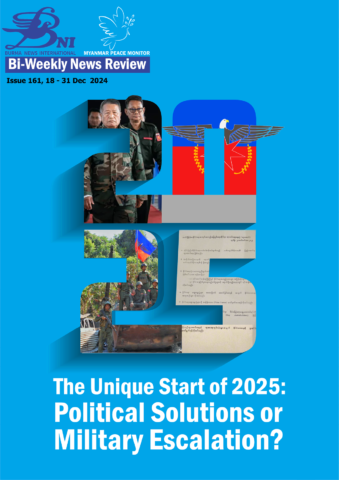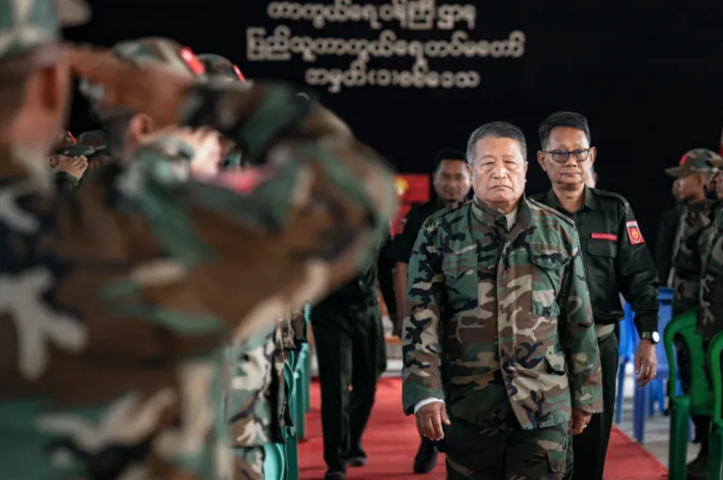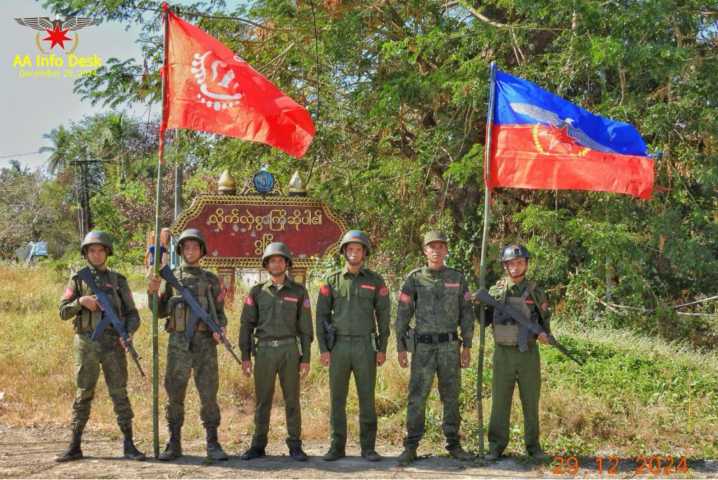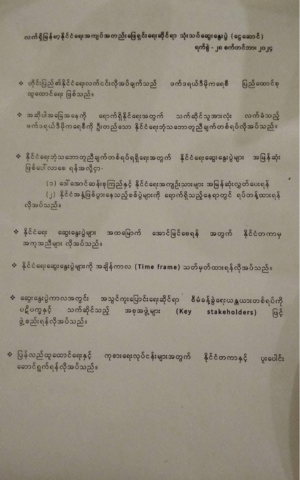
Introduction
The beginning of 2025 in the Spring Revolution is distinctly unique. The revolutionary forces concluded 2024 by seizing control of numerous camps and towns, leading the junta to lose up to 95 towns. As a result, the junta is now forced to call for dialogue, with the Chinese government stepping in to pressure the Ethnic Revolutionary Organizations (EROs).
The capture of camps and towns in the fight to end military dictatorship, combined with factors such as the growing military momentum of the revolutionary forces, the junta’s increasingly evident signs of defeat, changes within the NUG, the political steps taken by the United League of Arakan/Arakha Army (ULA/AA), and the discussions among certain politicians at the Ngwe Saung Gathering, all contributed to making the start of the year 2025 particularly significant.
Bi-Weekly News Review by Burma News International (BNI)-Myanmar Peace Monitor (MPM) highlights the factors that have made the beginning of the year 2025 in the Spring Revolution particularly unique.

To what extent will the NUG change?
In the first cabinet meeting of 2025, NUG Acting President Duwa Lashi La urged his cabinet members to move forward, declaring “2025 as a year of significant changes.”
The Acting President emphasized the urgent need to review the cabinet’s activities in 2024, ensuring that the future tasks of each ministry align with the people’s needs and strengthen relationships. He highlighted that in particular, 2025 is a pivotal year for the National Unity Government to embark on self-reforms and implement changes aimed at achieving more effective results, both in terms of structure and approach.
He also reaffirmed that the goal of “building a new federal democracy” and “rooting out the military dictatorship” will never be abandoned.
“We are not afraid of change. As a revolutionary government, we embrace change because we want it. We are committed to steering the country toward positive transformation for the people and the nation. If self-reform is needed, we want to show through our actions that we can boldly change ourselves for the interest of the country and its citizens, without hesitation,” said Acting President Duwa Lashi La during the cabinet meeting. 1
In an effort to accelerate the revolution, the NUG plans to make changes to its cabinet ministers even in early 2025. “We fully support reforms. We do not intend to hold these positions for life. Strengthening the NUG is crucial. We are always open to welcoming more capable and qualified who wish to contribute to the revolution,” Duwa Lashi La stated in an interview with Al Jazeera. 2
Although it remains confidential which ministries and ministers will be changed and when, changes within the NUG cabinet are likely to be seen at the beginning of 2025. We will have to wait and see if these changes align with the needs and expectations of the people.
ULA/AA’s political step
On 29 December 2024, the ULA, the political wing of the AA, issued a statement outlining its position on the same day the AA captured Gwa Township.

It is noteworthy that the ULA, which successfully captured and controlled up to 25 towns in Arakan State, including Paletwa and Samee in Chin State, from the junta, now refers to itself as the Arakan People’s Revolutionary Government. Although the offensives initiated by the AA on 13 November 2023 primarily aim to liberate the entire people of Arakan State, the ULA also believes that these efforts will contribute directly to the liberation of all the people of Myanmar from military dictatorship. However, the ULA has clearly stated its position, emphasizing that it is always ready to resolve the current political situation and events in Myanmar through political means rather than military means.
In addition, the ULA’s commitment to ensuring the safety of major business projects and investments in Arakan State (also known as Arakha Region), along with its desire for mutual cooperation, is aimed at alleviating the concerns of the international community, particularly the Chinese government.
The ULA’s statement released on 29 December 2024 highlights its military successes and readiness for political action, while also emphasizing the role of neighboring countries, including China, and international governments in the ongoing situation.
The Controversial Ngwe Saung Gathering
A single-page document with seven points titled “Discussion on Resolving Myanmar’s Current Political Crisis (Ngwe Saung),” dated 28 September 2024, created controversy at the start of 2025. Especially, it sparked significant debate, with criticisms and arguments portraying the political agreements made by various political forces in Myanmar.

In an interview with U Mya Aye, a leader of the 88 Generation Students, published on 1 January 2025, seven points from the Gathering were read and approved. 3 The discussion, held at Ngwe Saung beach in Ngwe Saung Township, Ayeyarwady Region, was attended by 38 politicians, journalists, and former political prisoners, including 88 Generation student leader U Mya Aye, Shan Nationalities League for Democracy (SNLD) Chair U Sai Nyunt Lwin, United Nationalities Democracy Party (UNDP) Chair U David Hla Myint, and Sai Ye Kyaw Swa Myint, who is working in election monitoring.
The seven agreements reached at the gathering are: The establishment of a federal democratic union is the immediate political need of Myanmar; to achieve this, a common political agreement on federal democracy, accepted by all stakeholders, is necessary; Political talks should be initiated as soon as possible to reach this common agreement, and Daw Aung San Suu Kyi and other political prisoners should be released as soon as possible; it is required to stop the ongoing conflicts at the locations where they have reached; international assistance is necessary for the emergence of political dialogues; a specific time period should be set for the discussions; during the discussions, a transitional management mechanism should be formed with key stakeholders involved in the conflict, and international cooperation is required for rehabilitation and remedial works.
Ko Min Thura Aung, who participated in the Ngwe Saung gathering, clarified that the points mentioned above are not definitive agreements, but rather a collection of opinions discussed during the meeting. He emphasized that political talks do not refer to meeting and negotiating with the military junta, but instead represent a proposal for a form of dialogue aimed at achieving transformation. 4
The opinions from the Ngwe Saung Gathering were brought to the Myanmar Affairs Talks (Jakarta Talks) held in Jakarta, Indonesia, on 4-5 October 2024. It can be said that the views of domestic political forces were presented to representatives of the National Unity Government (NUG), as well as to the UN, EU, and ASEAN. As a result, the Ngwe Saung Gathering and the collection of opinions that emerged through U Mya Aye’s interview on 1 January 2025 have become key considerations for the Spring Revolution forces, who are working toward the goal of ending the military dictatorship.
Review
Following Operation 1027, which began in 2023, the military council and its allies faced the strongest military pressure from the revolutionary forces throughout 2024. As a result, the junta lost hundreds of military bases, including 95 towns and two military command headquarters. It was evident that hundreds of junta soldiers, including major generals and brigadier generals, surrendered to the revolutionary forces by raising the white flag and were subsequently captured as prisoners of war (POWs).
According to BNI-MPM data, between 1 January and 31 December 2024, a total of 2,039 armed clashes occurred across Myanmar. Of these, 2,011 involved confrontations between junta forces and revolutionary forces. Notably, fighting between the Ethnic Revolutionary Organizations (EROs) and the military council army accounted for more than 60 percent of all armed clashes. Compared to the same period in 2023, the leadership and coordination of the EROs became more prominent.
To liberate the people and free them from the junta, revolutionary forces in northern Shan State, Chin State, and Arakan State have been actively engaged in offensives. Meanwhile, Karenni (Kayah) State and Karen State share similar military objectives and are eager to intensify their offensives against the military council troops. Additionally, coordinated military operations between the EROs and People’s Defense Force (PDF) battalions and units under the NUG have also been observed.”
The beginning of 2025 is likely to witness continued significant changes, both militarily and politically. As military actions intensify, achieving a common political consensus is becoming increasingly crucial. While the convergence of all political positions—such as those from the Ngwe Saung Gathering, common ground between the EROs and the NUG, and other potential political views—seems unlikely, it cannot be completely ruled out.
As NUG Acting President Duwa Lashi La stated, 2025 is likely to be seen as a year of significant changes. With such a notable start, it will be fascinating to see whether the focus throughout the year shifts toward military escalation, political solutions, or dialogue.
1 Excerpt from the address delivered by Acting President Duwa Lashi La, at the NUG’s cabinet meeting 1/2025, 7 January 2025.
2 Q&A: Leader of Myanmar’s shadow government talks civil war strategy in 2025, Aljazeera, 4 Jan 2025
3 We don’t want to restrict our own path by acknowledging that there is no room for negotiation when it comes to a blood debt, Ko Mya Aye, 88 Generation Students leader, Mizzima, 1 January 2025.
4 # Clarification as a participant in the Ngwe Saung Gathering, facebook.com/ minthuraaung.gbk, 6 January 2025
